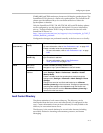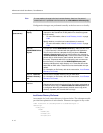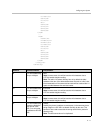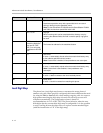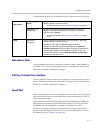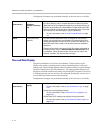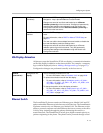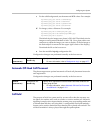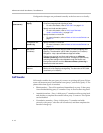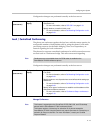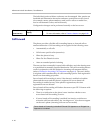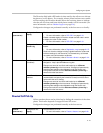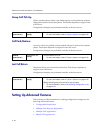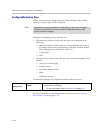
Configuring Your System
4 - 17
c For the solid backgrounds, set the name and RGB values. For example:
bg.hiRes.gray.pat.solid.3.name=”Gray”
bg.hiRes.gray.pat.solid.3.red=”128”
bg.hiRes.gray.pat.solid.3.green=”128”
bg.hiRes.gray.pat.solid.3.blue=”128”
d For images, select a filename. For example:
bg.hiRes.gray.bm.3.name=”polycom.jpg”
bg.hiRes.gray.bm.3.em.name=”polycomEM.jpg”
bg.hiRes.gray.bm.3.adj=”0”
The default size for images on a phone is 320 x 160. The default size for
images on an Expansion Module is 160 x 320. Use a photo editor on a
computer to adjust the image you want to display. (Edit the image so
the main subject is centered in the upper right corner of the display.)
Download the file to the boot server.
e Save the modified sip.cfg configuration file.
Configuration changes can performed centrally at the boot server:
Automatic Off-Hook Call Placement
The phone supports an optional automatic off-hook call placement feature for
each registration.
Configuration changes can performed centrally at the boot server:
Call Hold
The purpose of hold is to pause activity on one call so that the user may use
the phone for another task, such as to make or receive another call. Network
signaling is employed to request that the remote party stop sending media and
to inform them that they are being held. A configurable local hold reminder
feature can be used to remind the user that they have placed calls on hold. The
call hold reminder is always played through the speakerphone.
Central
(boot server)
Configuration file:
phone1.cfg
Specify which background will be displayed.
• For more information, refer to Backgrounds <bg/> on page A-77.
Central
(boot server)
Configuration file:
phone1.cfg
Specify which registrations have the feature and what contact to call
when going off hook.
• For more information, refer to Automatic Off-Hook Call Placement
<autoOffHook/> on page A-112.



